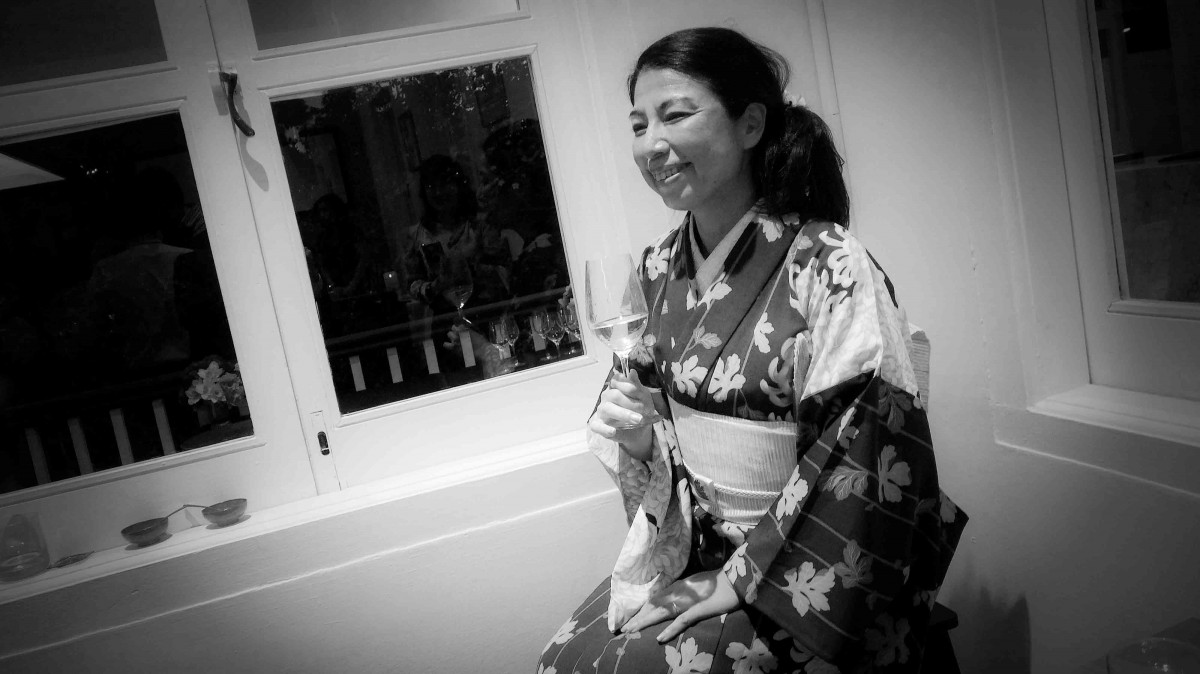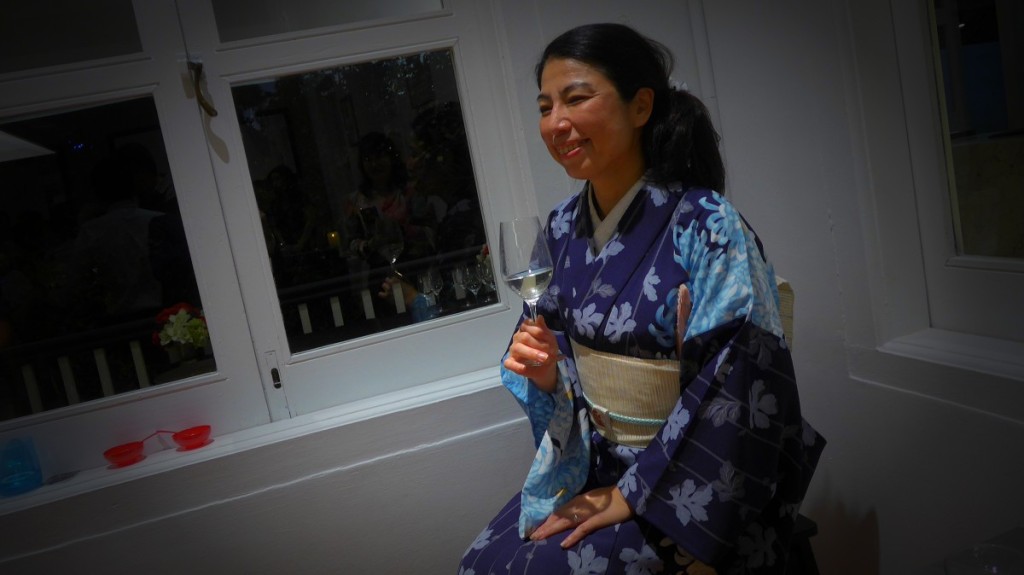
#238
SAKE SAMURAI
13 Oct 2015 By David Fuhrmann-Lim
It’s not every day you get to meet a Sake Samurai x Sake Sommelier, a double threat (or treat, rather). We spoke to Mariko Kiyonaga on World Sake Day (Oct 1) about her mission to spread the joy of sake appreciation to the world.
INTERVIEW BY ATSUKO SATO
World Sake Day was on October 1, and many sake-related events were held not just in Japan, Singapore, but also around the world. We had the privilege to speak to Mariko Kiyonaga, a Kikizakeshi (sake sommelier) and Sake Samurai (an ambassador spreading sake to the world). She had flown in to Singapore especially for a sake celebration at Lewin Terrace, a finely-tuned Japanese-French fusion restaurant. Parched managed to speak to her about her sake passion, and her vision of spreading this delicate drink to the world.
How did you become a Sake Samurai? “I organised sake club sessions for ladies 17 years ago. Then, it was not common for a club to focus on women, so that was considered a pioneer in the industry. I think I was recommended to be Sake Samurai because of the evaluation for the club’s long-term activity, and its power of influence in the sake industry.”
Do you need certification to become Sake Samurai? “To be a Sake Samurai (you can’t nominate yourself), you need to be ordained by the Sake Samurai headquarter. They confer it based on Kuramoto’s (sake breweries’) nomination for candidates.”
What is the biggest challenge to being a Sake Samurai? “Many big influencers and celebrities in the F&B industries are ordained as a Sake Samurai. However, I was a part-timer Sake Samurai when I was ordained since I had another job at that time. So, I had to be deal with the dilemma and pressure of having only limited time for Sake Samurai activities. It subsequently led me to set up my own company last year to promote sake.”
What is the attraction of sake? “Regional and cultural characteristics are one of attractions of sake. It is also easy to match local foods. All prefectures (states) in Japan have their distinct sakes. Affordable types of sake such as Futsu shu (ordinary sake) or Jyunmai shu (which is sake made from only rice, water, yeast, and koji) really match with their local cuisines.
“For example, the flavours of soy sauce (essential seasoning for Japanese food) are different depending on which area in Japan it is from – it gradually tastes sweeter as it goes from east to west. Sake in each area, somehow, matches well with tastes of soy sauce in their areas too. I think the differences come from the food culture in each area, and other factors as well. I find it makes sake interesting.
“Also, sake is made from rice, which is considered a staple in many places in the world. So sake can match well with almost any kinds of food. For me this is another attraction of sake.”
What is your most memorable drinking experience? “Let me talk about a episode which led me to become Kikizake-shi, a Sake Sommelier.
“Believe or not, I didn’t like drinking very much when I was young, I especially didn’t like sake. I started drinking beers and shifted to other alcohol spirits when I entered the industry as a new recruit (I was 22 years old!).
“In Japan then, cup sakes (ordinary sakes) were widely-distributed and it had really a strong smell; I didn’t like it so I concluded sake was not for me. However, after three years, I had an opportunity to try a Hanamidori sake, which I received as a gift from my business guest from Iwate prefecture. I tried it because he insisted I did. Surprisingly, I found its flavour was fruity – like a peach – and it was like a nice white wine. I hadn’t realised such a lovely sake existed. I asked if the sake was sold in Tokyo, but actually it was not.
“At that time the concept of local sake was not that popular in Japan yet. So there were only limited sake options available, even in Tokyo. I assumed there must be many good, unknown sakes, not only in Iwate prefecture but all over Japan. Experiencing Hanamidori motivated me to learn more about sake and to become Kikizake-shi, a Sake Sommelier.”

What is the best hangover cure? “I rather recommend how to avoid hangovers instead! I have three tips. First, don’t drink on an empty stomach; make sure you eat something before drinking. Second, try to drink three or four times more water than sake. And last, don’t mix different types of alcohol. If you drink a wine, you should stick to wines all night long. Let’s say a combination of beer, wine and sake might give you higher chance of a hangover.
Who is the person you would most like to drink with? “I would like to drink with Mr. Hidetoshi Nakata, a former Japanese professional football player. After retirement, his passion for sakes made him visit over 250 sake breweries. Now, he has created his own brand of sake, and has developed sake-related apps too. It would be nice if I could have a discussion about sakes with him.”
What Singaporean food goes well with sake? “Actually, any local food with rice (chicken rice etc) can match sake because sake is made from rice. There are many spicy foods in Singapore, right? I thought sake was not for spicy foods, but actually I’ve discovered sparking sakes and aged sakes pair well with spicy foods. The ones with lots of bubbles can go well with chilli sauces too.”
What is “sake” for you, what does it mean to you? “Sake” is one of the cultures I want to pass down for the generations. There are many sake breweries in Japan, and some of them even have 400- or 500-year-old histories. I believe their cultural background, history and depth of flavor is something that should be handed down through the generations. In Japan the sake market is shrinking, as are the breweries, but I have high hopes for the oversea markets. I hope sake will spread around the world.”
Lewin Terrace, 21 Lewin Terrace Singapore, Singapore 179290. Tel: 6333-9905.
The interview was done by Atsuko Sato, this is her first story for Parched. She’s one third of the award-winning bloggers Ninja Girls, three Japanese women who love love love living in Singapore.
Like this? Read about another sake sommelier at one of our fave new bars Kakure

You might be interested in...
DRINK HERE: SINGAPORE SAKE FESTIVAL 2024
Singapore's Oldest Sake Festival Turns 9 This Weekend and You're Invited!
DRINK THIS: RASEN SAKE
Chef Willin Has Helped to Create a Sake to Pair With Singapore Cuisine. Subarashi!
SAKE MATSURI 2023
If You Only Go to Two Events This Year, Then Make Both The Sake Matsuris Your Drinking Highlight. The Second Edition For 2023 is Happening on 1-2 April — Get Your Tickets Now.
DRINK HERE: SINGAPORE SAKE FESTIVAL 2024
DRINK THIS: RASEN SAKE
SAKE MATSURI 2023